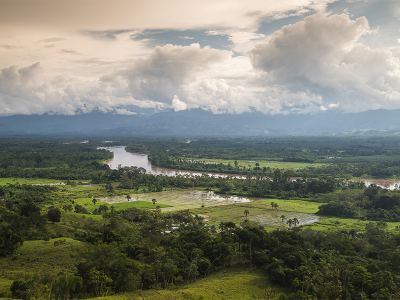Biodiversity & Species
St. Valentine’s Other Assignment
Along with lovers, couples, and marriage, he has a more environmental domain.
St. Valentine is associated with love and romance. He is also the patron saint of beekeepers. It’s unclear why. Maybe it’s the association of honey with happiness and affection, especially in the age before chocolate reached Europe. Or maybe it’s because of the “birds and the bees” as models for explaining sex to children. Whatever …
Continue reading “St. Valentine’s Other Assignment”
CONTINUE READINGTwo Cheers For CEQA
A recent case shows why the law is so important – and how it can be abused
Even the best and conscientious developers gnash their teeth at CEQA, California’s environmental review law, and one can see why: it can allow NIMBYs to block useful housing and supercharge exclusion. But there’s a reason why the law was passed and why it has persisted, and we saw it three days ago: Trees of Los …
Continue reading “Two Cheers For CEQA”
CONTINUE READINGHow California (and the World) Get to 30×30
COP15 in Montreal ended with a pledge to protect 30 percent of the planet by 2030. UCLA student analysis shows what we can learn from California’s own plan.
By Ashley Anderson, Elana Nager, and Madeline Ward As 2022 wound down, the United Nations Biodiversity Conference (COP 15) convened in Montreal. The conference ended with around 190 of the world’s nations adopting the Kunming-Montreal Global Biodiversity Framework, which establishes four goals and twenty-three targets to be achieved by 2030. The most prominent of these …
Continue reading “How California (and the World) Get to 30×30”
CONTINUE READINGThe Ninth Circuit Court of Appeals’ 10 Most Important Environmental Law Decisions of 2022
Climate Change, Water Rights, Environmental Justice & Federalism Issues Highlighted the Ninth Circuit’s Prodigious Environmental Docket This Year
I’ve shared in previous posts my view that the U.S. Court of Appeals for the Ninth Circuit is–after the U.S. Supreme Court–the most influential court in the nation when it comes to environmental and natural resources law. That’s true for two related reasons: first, the sprawling Ninth Circuit encompasses nine different states (including California) and …
CONTINUE READINGGuest Contributor Laurel Hunt: Egypt’s Corals Get a Seat at the Table at COP27
The region’s coral reefs are a precious resource under threat, but they also exhibit exceptional thermal tolerance to heat stress
Laurel Hunt (UCLA JD ’23) attended COP27 as a member of the UCLA Emmett Institute delegation. This is her fifth UN Climate meeting. This year, she moderated two panels on coral reefs and risk mapping. She is the former Executive Director of Los Angeles’ regional climate collaborative and an international city-to-city climate network. As global climate leaders edged toward …
Continue reading “Guest Contributor Laurel Hunt: Egypt’s Corals Get a Seat at the Table at COP27”
CONTINUE READINGGCF Task Force Exchange of Experiences in San Martin, Peru
Notes from the Field
From October 10-13, 2022, the Governors’ Climate and Forests Task Force (GCF Task Force) – a project of the Emmett Institute on Climate Change and the Environment at UCLA School of Law and UCLA’s Institute of the Environment and Sustainability, in partnership with the Institute of Behavioral Science at the University of Colorado, Boulder – and …
Continue reading “GCF Task Force Exchange of Experiences in San Martin, Peru”
CONTINUE READINGHow Much Is Nature Worth?
Federal Government Launches Major Accounting Initiative
When we bite into a juicy apple we may think of the farm’s orchard, but not of the natural pollinators that fertilize the apple blossom so the fruit can set. When we drink a cool glass of water from the tap we may think of the local reservoir, but the real source of the water …
Continue reading “How Much Is Nature Worth?”
CONTINUE READINGA Beautiful Day for Bumblefish?
A California court just ruled that bumblebees are fish. It’s not as crazy as it sounds.
A California appeals court ruled last week that bumblebees are fish and are therefore protected by the California Endangered Species Act (CESA). That may sound ridiculous, but there’s actually a convoluted legal argument to support the court. That argument does justify giving the CESA some extra coverage beyond what we would ordinarily classify as fish. …
Continue reading “A Beautiful Day for Bumblefish?”
CONTINUE READINGWhen is a bee a fish?
The California Court of Appeal finds that invertebrates can be protected under the California Endangered Species Act
That was the question before the Third District of the California Court of Appeal. The California Fish and Game Commission had accepted petitions to list four species of native California bees for protection under the California Endangered Species Act (CESA). A group of agricultural trade associations challenged the decision as exceeding the Commission’s authority …
Continue reading “When is a bee a fish?”
CONTINUE READINGWar and the Environment: Ukraine in 2022
The environment is also a victim of the Russian invasion — perhaps to the point of being a war crime.
Memorial Day began as a day to commemorate the Civil War dead, then became a day to commemorate the dead from many wars. But war’s toll goes beyond direct harm to humans. The environment also suffers. On top of its human tragedies, the Russian invasion of Ukraine is also wreaking environmental havoc. One source of …
Continue reading “War and the Environment: Ukraine in 2022”
CONTINUE READING











